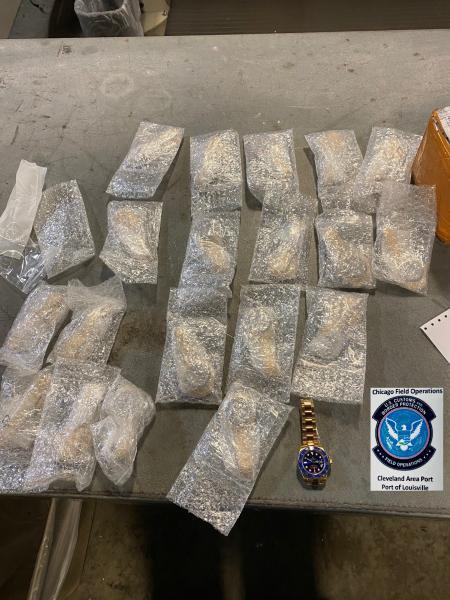LOUISVILLE, KENTUCKY — U.S. Customs and Border Protection (CBP) officers assigned to the Port of Louisville seized a shipment arriving from Hong Kong that contained 20 counterfeit Rolex watches that, if genuine, would have had a MSRP over $491,000.
Officers halted the shipment that was heading to a residence in Miami, Florida. The parcel was manifested as plastic cards. Officers inspected the shipment to determine if the goods were admissible in accordance with CBP regulations. The officers found a total of 20 Rolex watches deemed to be counterfeit by CBP’s trade experts at the Centers of Excellence and Expertise. All of the watches displayed the protected Rolex trademark. The total declared value for the box was listed as $100 but had the 20 watches been real the cumulative MSRP would have been worth $491,980.
Historically, counterfeit watches and jewelry have been one of the top seized counterfeit products by CBP, with more than a quarter of the counterfeit goods coming from Hong Kong. Counterfeit watches and jewelry make up almost half of the total MSRP of seized goods (an average of $650 million over the last two years).
“Consumers should be aware that if a known high-value brand is being offered for an unusually low price, it could very well be fake. CBP encourages the use of reputable vendors for your valuable purchases,” said Thomas Mahn, Louisville Port Director. “Our officers are dedicated to preventing counterfeiters from defrauding consumers and legitimate businesses.”
Sold in underground outlets and on third party e-commerce websites, counterfeit commodities fund smugglers and members of organized crime. Consumers often believe they are buying a genuine product but soon realize the item is substandard.
CBP Trade protects the intellectual property rights of American businesses through an aggressive Intellectual Property Rights enforcement program, safeguarding them from unfair competition and use for malicious intent while upholding American innovation and ingenuity. Suspected violations can be reported to CBP here.
Every year, CBP seizes millions of counterfeit goods from countries around the world as part of its mission to protect U.S. businesses and consumers. These goods include fake versions of popular products, such as smartphones and related accessories, electronics, apparel, shoes, cosmetics, and high-end luxury goods, as well as goods posing significant health and safety concerns, such as counterfeit pharmaceuticals, bicycle and motorcycle helmets, medical devices, supplements and other consumables. Sold online and in stores, counterfeit goods hurt the U.S. economy, cost Americans their jobs, threaten consumer health and safety, and fund criminal activity. Visit the National IPR Coordination Center for more information about IPR including counterfeiting and piracy.
Counterfeiting and piracy cost the U.S. economy between $200 billion and $250 billion per year, are responsible for the loss of 750,000 American jobs, and pose a threat to health and safety. CBP protects the intellectual property rights of American businesses through an aggressive Intellectual Property Rights enforcement program, safeguarding them from unfair competition and use for malicious intent while upholding American innovation and ingenuity. Suspected violations can be reported to CBP here.
CBP’s border security mission is led at 328 ports of entry by CBP officers from the Office of Field Operations. Please visit CBP Ports of Entry to learn more about how CBP’s Office of Field Operations secures our nation’s borders. Learn more about CBP at www.CBP.gov.
